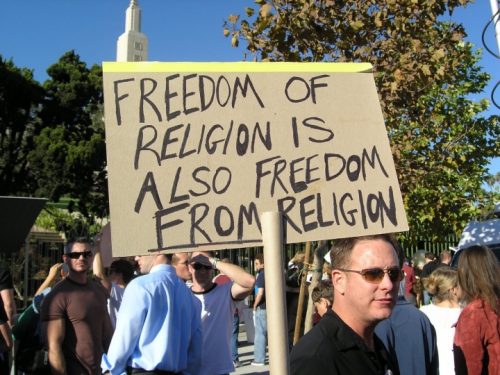

By The Vanguard
ST MARYS, WV – An incarcerated atheist and secular humanist cannot be forced to participate in “religiously affiliated programming” in order to be eligible for parole, according to a West Virginia judge here last month.
According to a story in the Guardian, U.S. District Judge Joseph Goodwin ruled St. Marys Correctional Center inmate Andrew Miller “easily meets his threshold burden of showing an impingement on his rights.”
The judge said the “unmitigated actions force Mr. Miller to choose between two distinct but equally irreparable injuries,” either “submit to government coercion and engage in religious exercise at odds with his own beliefs” or “remain incarcerated until at least April 2025.”
Goodwin issued a preliminary injunction requiring “officials to remove completion of a state-run and federally funded residential substance abuse program from Miller’s parole eligibility requirements. The agency did not comment,” said the Guardian.
In Miller’s April suit, he said the state-forced Christianity on incarcerated people and failed to “accommodate repeated requests to honor his lack of belief in God.”
The suit claimed Miller encountered “religious coercion” in June 2021 when he entered the Pleasants County Correctional Facility. Miller is serving a one- to 10-year sentence for breaking and entering. Substance use was not a factor in his offense, but Miller was enrolled in the program because he is in recovery from addiction, wrote the Guardian.
Miller alleged the federally-funded substance abuse treatment program—a requirement for his parole consideration—was “infused with Christian practices” including “Christian reading materials and mandated Alcoholics Anonymous or Narcotics Anonymous meetings, where the Serenity and Lord’s Prayer are recited.”
The Guardian reported that because of the “religious elements of the program, Miller withdrew from it after five days. Before incarceration, he received secular treatment and maintained his sobriety for four years, according to his suit.”
Multiple courts have determined that step-based programs like Alcoholics Anonymous and Narcotics Anonymous are religious-based because they ask, said the Guardian, participants to turn their “lives over to the care of God” and encourages prayer to improve “conscious contact with God.”
The Guardian wrote, “In the Big Book, the foundational document of these programs, Chapter 4: We Agnostics tells atheists and agnostics that they are ‘doomed to alcoholic death’ unless they ‘seek Him.’”
Judge Goodwin said religious-based programs violate the First Amendment, adding, “I have been provided with no evidence that West Virginia’s program is any less religious or less coercive than the programs invalidated in other jurisdictions.”
Miller alleged his failure to complete the program contributed significantly to the decision of the state parole board to not attend the classes. The state did not dispute that, reported the Guardian.
“Although Mr. Miller has no entitlement to parole, the record strongly suggests that he would already have been released but for maintaining his objections to an unconstitutional policy,” Goodwin said.
Geoffrey T Blackwell, counsel for American Atheists who represented Miller with the non-profit legal services organization Mountain State Justice, called the ruling “a complete vindication of Andrew’s rights under the law. Without Andrew’s willingness to take on this fight, West Virginia would continue to unconstitutionally impose religion on people in its corrections system, said the Guardian.
Lesley Nash, an attorney with Mountain State Justice, told the Guardian his organization was pleased the court protected Miller’s rights when the state did not, adding, “No one should be forced to set aside their moral or religious creed as a precondition of their parole.”
That religious programming should be completely abolished and replaced with a completely secular program.